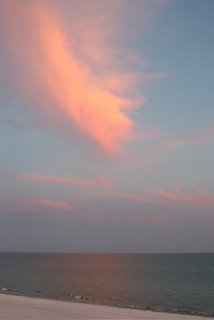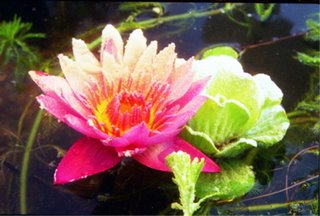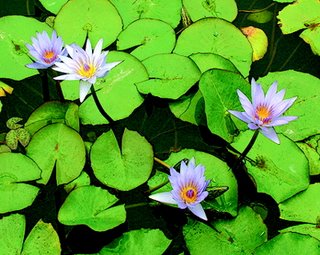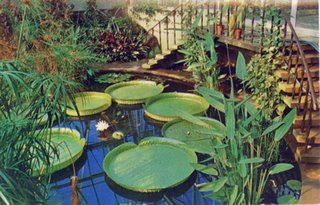I get calls from folks with pond problems. Here's one I got recently. A woman has a concrete pond with a huge crack in it. She hired a local pond professional to repair it and he guaranteed the repair. Neither she nor I know what he did, but he did not fix it. He has been back to try again a few times, but has failed each time. He now wants more money to continue to try. I told her that in my years of experience, you never, ever guarantee the repair of concrete. Most of the time concrete cannot be repaired. Just look at our expressways to see how brittle concrete is.
Our ground is always moving, water comes up and recedes, concrete freezes and thaws. Sadly it is not plastic, it is pretty solid and eventually cracks. The ONLY way I know to repair a crack in a concrete pond and this is definitely not guaranteed is to scrape out the crack, get it clean and dry and then use Plumbers' Epoxy and mash it in the crack. Make absolutely sure you are wearing rubber gloves while using Plumbers' Epoxy or you will be wearing the epoxy for weeks.
Remember this is not guaranteed, but it's the best I know.
And if somebody guarantees a concrete repair, do not believe them. They have not had enough pond experience.
Time to time musings about backyard garden pond building, keeping, troubleshooting. Questions and answers from pond keepers and builders. Occasional excerpts from the pondlady's book, "A Practical Guide to Building and Maintaining your Pond."
Friday, December 15, 2006
Thursday, December 14, 2006
Pond vacuum cleaners
I get letters about pond vacs. There are some that work great, but they are not cheap, nor are they perfect. Most of the letters I receive are asking about a cheap pond vac.
There are vacuum cleaners sold at swimming pool places. They look like large swimming pool blue dinner plates with a large hole in the center and attach to a garden hose. The force from the water going through the garden hose pushes the debris into a net that you have attached to the top of the 'dinner plate'. They will rarely do any good because they are best at removing leaves, etc., not clumped up dead algae. I have tried replacing the commercial net that you get when you by one of these, with an old panty hose leg and it works better, but still not great.
There are vacuum cleaners sold at swimming pool places. They look like large swimming pool blue dinner plates with a large hole in the center and attach to a garden hose. The force from the water going through the garden hose pushes the debris into a net that you have attached to the top of the 'dinner plate'. They will rarely do any good because they are best at removing leaves, etc., not clumped up dead algae. I have tried replacing the commercial net that you get when you by one of these, with an old panty hose leg and it works better, but still not great.
Wednesday, December 13, 2006
Ponds in a Warm Winter
We had a cold snap a week or so ago and the entire upper half of the US was hammered with snow, ice, high winds and just horrible weather. Here in New Orleans, we had temperatures in the 20's and that is really unusual.
Up north, ponds froze over, fish were at the bottom of the pond in torpor and we all thought winter was here. Wrong. It is now back to the 50's up north, ponds are no longer frozen and fish are swimming around happily.
The big question is "Do we feed our fish?"
I think not. The temps will drop again soon. It is dicey to feed fish when the temps are below 55 degrees anyway. Their digestive systems slow down and they may well have some problems with food. Any left over food will just stay in the water and decompose, thereby fouling the water.
Up north, ponds froze over, fish were at the bottom of the pond in torpor and we all thought winter was here. Wrong. It is now back to the 50's up north, ponds are no longer frozen and fish are swimming around happily.
The big question is "Do we feed our fish?"
I think not. The temps will drop again soon. It is dicey to feed fish when the temps are below 55 degrees anyway. Their digestive systems slow down and they may well have some problems with food. Any left over food will just stay in the water and decompose, thereby fouling the water.
Monday, December 11, 2006
Plant parasites
Pond plants can be infected with so many parasites. And the best way to find them is to get fish or plants from the wild. If you have the courage to walk into the swamps for plants (and I would not), then please take precautions with your plant treasures when you get home. Roots of wild plants can house parasites, fish eggs, snails, crawfish that will create havoc in your pond. If one plant has spider mites of caterpillars, your entire plant collection can become infected.
If you must collect from the wild, quarantine your collected plants for at least a month before introducing them to your pond. I often put a tablespoon of chlorox in the water just to make sure the bad critters are killed.
If you must collect from the wild, quarantine your collected plants for at least a month before introducing them to your pond. I often put a tablespoon of chlorox in the water just to make sure the bad critters are killed.
Thursday, December 07, 2006
Winter pond days

When the temps are below freezing, or at least were last night, no one is out relaxing and enjoying their pond.
Check your water lily corms that you put in wet sand and then in plastic bags and stored in the garage. If they are mushy, throw them in the compost heap. If they are still firm, all is OK. You will pot them up in the spring. Until then, you can enjoy a picture of them.
Wednesday, December 06, 2006
If your pond freezes
You woke up this morning and your pond was iced over. You forgot to throw a semi filled water jug in the pond last night and now you have no hole in the ice through which gases can be exchanged. Do not hit the ice with a hammer. The shock can kill your fish. Get a pot of warm water and set it on the ice. That will thaw the ice. Now go find that jug, put a couple of cups of water in it and put it in your pond, so you can pull it out tomorrow morning.
Tuesday, December 05, 2006
In the 20s this morning
Good grief, it's cold for Southern Louisiana. My zinnias bit the dust, my mums are brown. The Louisiana Iris loves this weather and sticks up like the flag it is called in other parts of the world. My cassia is droopy but that's weight, not cold. The snaps, pansies and petunias are happy in their beds covered with a blanket of mulch so just their heads stick out. The pond looks lifeless with no water moving. The fish are at the bottom, not moving at all; it looks like they are barely breathing. But when the water warms they will wake up and be fine.
Monday, December 04, 2006
Here we go again
It's not even 40 degrees outside. And there's a wind, so it feel even colder. The pond is doing fine all by itself. I have removed the pump and tubing. Nothing will cause tubing to crack faster than sun and cold and we have both. One spring task I hate is having to replace cracked and leaking plastic tubing that usually can't be found until the water has been pumped out of the pond. The pump is cleaned and sitting in water in the garage. If a pump is stored dry, the seals are likely to dry out, crack and the pump will never work again. If you are at the beginning of winter, its time to tend to your pump and tubing. If you live in the American Midwest, let the tubing crack and stay inside until it warms up. It is too awful out there to worry about a few bucks worth of plastic tubes.
Saturday, December 02, 2006
It's cold this morning
Friday, December 01, 2006
Winter plants
Now that winter is here, you can liven up your pond with artificial plants until your real ones return in the spring.
Wednesday, November 29, 2006
Tuesday, November 28, 2006
Monday, November 27, 2006
just pictures
Saturday, November 25, 2006
water lily pics
Friday, November 24, 2006
Pond Letters
I have a plan for 2 ponds connected by a waterfall on the side of a steep
north facing slope. I have 2 different pond builders bidding on the job,
one uses strictly concrete and one a liner Aquascape system. While clearing
the site of grasses this weekend I noticed a gopher housing project going on
very close to pond site. Should I not even consider using a liner? Will
the rocks that completely cover the liner and weight of the water be enough?
Or could we line it with carpet or wire? I am learning a lot but didn't see
much about the darn rodents!
Answers
Hi,
When I built our pond (3 yrs. ago-3,000 gal.) I put lots of chicken wire down
first, and then old carpet before I put the heavy duty liner inside. I
haven't had any problems with gophers or leaks :)
We have no gophers (that I know of) here in New Orleans, but the chicken
wire sounds good. Just a note of caution, though. The Aquascapes system does
not build the pond above grade and the rocks are a PITA when pond cleaning
time comes every year. Unless you are under a tree, you do not need a
skimmer and most probably don't need a biofilter either. Don't let them sell
you (for a great deal of $$) things you don't need. Concrete is most always
a bad idea because it isn't elastic, won't move with the ever moving ground
and will crack at some time, always sooner rather than later.
Gopher removal:
Unless you intend to tame the gophers, (burrowing North American RODENT according to definition in the dictionary) I think you should first check with Wildlife Commission to see if (1) you have rights to move them to a more suited environment, (2) if they are prone to mark their territory and return, (3) have the Animal Resque League (police) trap & move them to a m
Jore fitting area.
As far as construction of your pond, CONCRETE DOESN'T HOLD WATER! So, if this guy/gal doesn't tell you it will be painted with Elastomeric to wet seal, then two coats of Ramuc (black/blue/white) to fish proof..........RUN!
AquaScape Design doesn't work in Mississippi (differing opinion from manufacturers & some designers not in my area) without the addition of special blends of bacteria (8 or more strains targetting string algae). I also prefer UV lights (some like the natural approach/not me/too busy to mess with) to keep water crystal clear & as healthy as it can be. Add Magnitizer (RED one) to target string algae, with right formula of fish & plants. Also, N E V E R plant your vegetation in a rock bottom pond!!!
Weight of water and stones will not hold down liner if trouble comes.
north facing slope. I have 2 different pond builders bidding on the job,
one uses strictly concrete and one a liner Aquascape system. While clearing
the site of grasses this weekend I noticed a gopher housing project going on
very close to pond site. Should I not even consider using a liner? Will
the rocks that completely cover the liner and weight of the water be enough?
Or could we line it with carpet or wire? I am learning a lot but didn't see
much about the darn rodents!
Answers
Hi,
When I built our pond (3 yrs. ago-3,000 gal.) I put lots of chicken wire down
first, and then old carpet before I put the heavy duty liner inside. I
haven't had any problems with gophers or leaks :)
We have no gophers (that I know of) here in New Orleans, but the chicken
wire sounds good. Just a note of caution, though. The Aquascapes system does
not build the pond above grade and the rocks are a PITA when pond cleaning
time comes every year. Unless you are under a tree, you do not need a
skimmer and most probably don't need a biofilter either. Don't let them sell
you (for a great deal of $$) things you don't need. Concrete is most always
a bad idea because it isn't elastic, won't move with the ever moving ground
and will crack at some time, always sooner rather than later.
Gopher removal:
Unless you intend to tame the gophers, (burrowing North American RODENT according to definition in the dictionary) I think you should first check with Wildlife Commission to see if (1) you have rights to move them to a more suited environment, (2) if they are prone to mark their territory and return, (3) have the Animal Resque League (police) trap & move them to a m
Jore fitting area.
As far as construction of your pond, CONCRETE DOESN'T HOLD WATER! So, if this guy/gal doesn't tell you it will be painted with Elastomeric to wet seal, then two coats of Ramuc (black/blue/white) to fish proof..........RUN!
AquaScape Design doesn't work in Mississippi (differing opinion from manufacturers & some designers not in my area) without the addition of special blends of bacteria (8 or more strains targetting string algae). I also prefer UV lights (some like the natural approach/not me/too busy to mess with) to keep water crystal clear & as healthy as it can be. Add Magnitizer (RED one) to target string algae, with right formula of fish & plants. Also, N E V E R plant your vegetation in a rock bottom pond!!!
Weight of water and stones will not hold down liner if trouble comes.
Thursday, November 23, 2006
roofing material as pond liner
I had an inquiry about using roofing material as a pond liner. I looked it up online and found the following from a manufacturer of roofing material. I guess we can't get a better answer than this:
There is a difference in Pond Liner EPDM and roof grade EPDM.
Most roof grade EPDM is chemically compounded to be specifically used in roofing installations. Part of the mixing and compounding process usually includes the use of additives such as anti bacterial and anti fungicide agents that will prevent mold, mildew, fungus and other such growths from happening on a roof top. These are additives that the pondkeeper would prefer NOT to have in their pond liner, particularly in order to maintain the health and proper balance of the pond life.
EPDM Pond liners are proven fish friendly, and is a membrane which has no anti bacterial or anti fungicide additives used in the manufacturing process. In addition EPDM Pond Liners are practically talc FREE. Thus providing an enhanced performance of the sheet as a 100% secure and healthy habitat for all of your pond life.
If you are a roofing contractor and use roofing EPDM, then buy Roof Grade EPDM with all of the additives. If you need Pond Liner EPDM and would like to maintain a healthy pond environment, then buy an EPDM Pond Liner!
Remember, American Wholesale Supply Company (AWSC) wants your business and we will show you the best products, services and pricing on the net!
There is a difference in Pond Liner EPDM and roof grade EPDM.
Most roof grade EPDM is chemically compounded to be specifically used in roofing installations. Part of the mixing and compounding process usually includes the use of additives such as anti bacterial and anti fungicide agents that will prevent mold, mildew, fungus and other such growths from happening on a roof top. These are additives that the pondkeeper would prefer NOT to have in their pond liner, particularly in order to maintain the health and proper balance of the pond life.
EPDM Pond liners are proven fish friendly, and is a membrane which has no anti bacterial or anti fungicide additives used in the manufacturing process. In addition EPDM Pond Liners are practically talc FREE. Thus providing an enhanced performance of the sheet as a 100% secure and healthy habitat for all of your pond life.
If you are a roofing contractor and use roofing EPDM, then buy Roof Grade EPDM with all of the additives. If you need Pond Liner EPDM and would like to maintain a healthy pond environment, then buy an EPDM Pond Liner!
Remember, American Wholesale Supply Company (AWSC) wants your business and we will show you the best products, services and pricing on the net!
Tuesday, November 21, 2006
Cheap pumps
Lots of us want to buy cheap pumps from a big box store. While they usually perform as expected, they don't perform as long as more expensive ones. Worse than that, they cost much more per month to operate. The more expensive the pump, normally, the cheaper the operating costs.
Electric costs are easy to compute. I am often asked how much it costs to run a submersible pump and if there is a difference between brands. I will use the example of a 100 watt light bulb and a utility cost of $0.08 per KWH. A KWH is a kilowatt-hour or, 1,000 watts used for 1 hour. A 100 watt light - .1 kilowatt or .1 KWH = less that 1 cent per hour.
• Find the actual wattage used by the motor. (If the actual amp draw is not available, estimate by using the full load amps plate.)
• Watts = volts x amps for single phase motors. The light bulb has an amp draw of 8.7 x 115 volts = 100 watts.
• Compute your cost per month by multiplying the KWH x 24 (hours used per day) x 30 (days used per month) x cost in KWH (to find the actual cost look at your last power bill and divide the total power charges byt KWH used).
Electric costs are easy to compute. I am often asked how much it costs to run a submersible pump and if there is a difference between brands. I will use the example of a 100 watt light bulb and a utility cost of $0.08 per KWH. A KWH is a kilowatt-hour or, 1,000 watts used for 1 hour. A 100 watt light - .1 kilowatt or .1 KWH = less that 1 cent per hour.
• Find the actual wattage used by the motor. (If the actual amp draw is not available, estimate by using the full load amps plate.)
• Watts = volts x amps for single phase motors. The light bulb has an amp draw of 8.7 x 115 volts = 100 watts.
• Compute your cost per month by multiplying the KWH x 24 (hours used per day) x 30 (days used per month) x cost in KWH (to find the actual cost look at your last power bill and divide the total power charges byt KWH used).
Monday, November 20, 2006
Liner questions
Question: Can I use a cheaper liner than EPDM?
Pondlady sez:
The biggest enemy for any liner is the sun. I have never found a liner that does not crack and break after a season or two except EPDM. Replacing a liner is harder than building the pond the first time.
I have seen ponds done with kiddie pools and yes, they work just fine untl they crack. The preformed ponds that you can buy at big box stores crack just as fast. If you must use a preformed pond, buy a horse drinking trough. Usually they are made by Rubbermaid and last forever. I had one buried in the ground when Katrina hit, left it there for a year. When I retrieved it, it was fine. I now have in my new front yard.
Pondlady sez:
The biggest enemy for any liner is the sun. I have never found a liner that does not crack and break after a season or two except EPDM. Replacing a liner is harder than building the pond the first time.
I have seen ponds done with kiddie pools and yes, they work just fine untl they crack. The preformed ponds that you can buy at big box stores crack just as fast. If you must use a preformed pond, buy a horse drinking trough. Usually they are made by Rubbermaid and last forever. I had one buried in the ground when Katrina hit, left it there for a year. When I retrieved it, it was fine. I now have in my new front yard.
Sunday, November 19, 2006
Pond without rocks?
You can build a pond outdoors using no rocks at all. Use landscape timbers and stack them 18" high in any shape from a square to a rectangle to any other geometric shape. Use 16 penny nails to nail the timbers together. Line the inside with roofing felt as a cushion for you liner. Drop your 45 mil liner in, fill the pond with water. The liner is now sticking over the edge a few inches. Use a 1 x 4 to finish the top. You can use a 1 x 6 if you want to use it for a shelf for plants or rocks. If you want a waterfall, put one in one of the corners or build one in the middle. Looks great and is much cheaper than using rocks.
Friday, November 17, 2006
Make a tabletop pond
Building a tabletop fountain or pond is easy. First find a pretty pot. I usually use a ceramic one. Make sure it has no holes in the bottom. The easiest way to get a bubbling noise is to put a tiny pump in the bottom, fill the pot with round pebbles and turn on the pump.
If you wish to be a bit more elaborate, you can omit the rocks, put a couple of indoor plants like spaths or pothos in there, find some pretty larger flat rocks to cover the tops of the pots in the water, and then put a pump in. Make it as elaborate or simple as you wish. Plants around the pot make a beautiful backdrop for your indoor pond. If you wish to put a goldfish in it, be sure to include aquarium filtration and feed your fish, but sparingly. You will need to exchange the water occasionally so don't make it so large that you cannot easily manage to carry it.
If you wish to be a bit more elaborate, you can omit the rocks, put a couple of indoor plants like spaths or pothos in there, find some pretty larger flat rocks to cover the tops of the pots in the water, and then put a pump in. Make it as elaborate or simple as you wish. Plants around the pot make a beautiful backdrop for your indoor pond. If you wish to put a goldfish in it, be sure to include aquarium filtration and feed your fish, but sparingly. You will need to exchange the water occasionally so don't make it so large that you cannot easily manage to carry it.
Subscribe to:
Comments (Atom)








